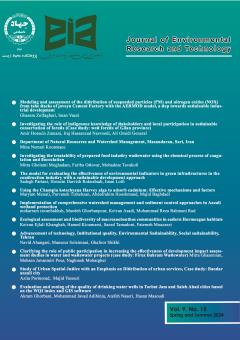Clarifying the role of public participation in increasing the effectiveness of development impact assessment studies in water and wastewater projects (case study: Firuz Bahram Wastewater)
Subject Areas : Environmental impact assessment
Mitra Ghasemian
1
,
Mohsen Javanmiri pour
2
![]() ,
Naghmeh Mobarghei
3
,
Naghmeh Mobarghei
3
1 - Shahid Beheshti University
2 - Natural Resources Organization
3 - Shahid Beheshti University
Keywords: Public participation, Development impact assessment, Wastewater treatment,
Abstract :
Public participation in the construction of water treatment plants is not desirable, this research was conducted by using the people's participation on the effectiveness of evaluation studies on the effects of development on wastewater management in order to reduce economic, social and environmental problems and by using questionnaire tools and completing it by citizens in the field. This research is descriptive-analytical. The statistical population includes the residents of Firoz Bahram neighborhood, including general residents, students and refinery workers. A statistical sample of 274 people was selected by simple random sampling with Cochran's formula. The reliability of the questionnaire was confirmed by Cronbach's alpha coefficient (0.9). After validation, the questionnaire was evaluated under the supervision of experts and the data was analyzed at the level of descriptive statistics. According to the one-way variance analysis test and the analysis of this test, there is a significant relationship between people's education and the effectiveness of popular participation. According to the results, the notification of the water and wastewater company in the field of related activities is 24.1% very good, 13.5% very poor, the role of citizens in achieving and rejecting the project is 35% very good, 8% very poor and the level of transparency and justice in general participation is 10.6% very good, 28.8% very poor. Also, 86.1% approved and 13.9% rejected the effectiveness of government officials' attitude in applying cooperative projects. Management, economic problems, social costs and information are effective factors in the lack of acceptance and public participation in sewage projects. Also, the notification of development plans should be continued continuously before the start of the project, during its implementation and completion.
